How Boer bucks are improving goat farming in Rwamwanja settlement
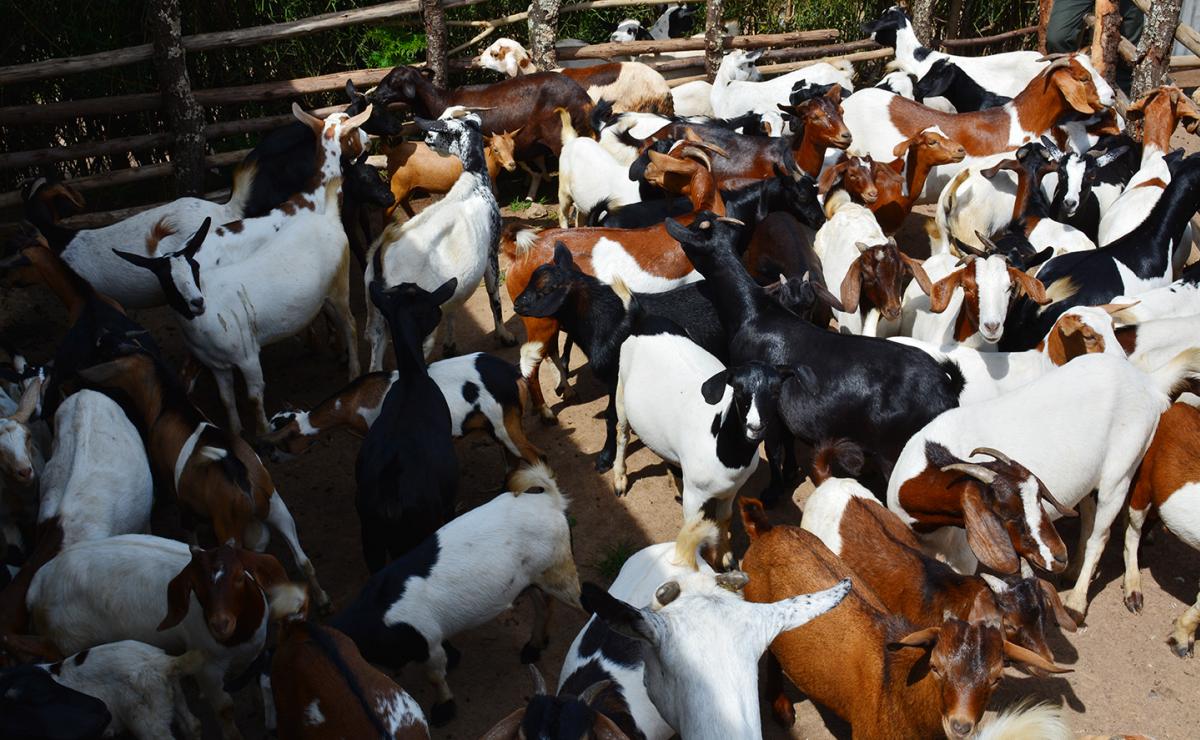
He ventured into goat farming with 13 local breed goats three years ago. Manowa Bihonzi, a Congolese refugee and a resident of Rwamwanja settlement, has now expanded the farm to 70 goats. In addition to the local breed goats, Bihonzi now has Boers, and cross breeds on his farm.
Bihonzi’s goat farm started to expand in 2016 when he was offered a Boer buck for multiplication and breed improvement by the Lutheran World Federation (LWF), with funds from the American government through the Bureau of Population, Refugees and Migration (PRM).
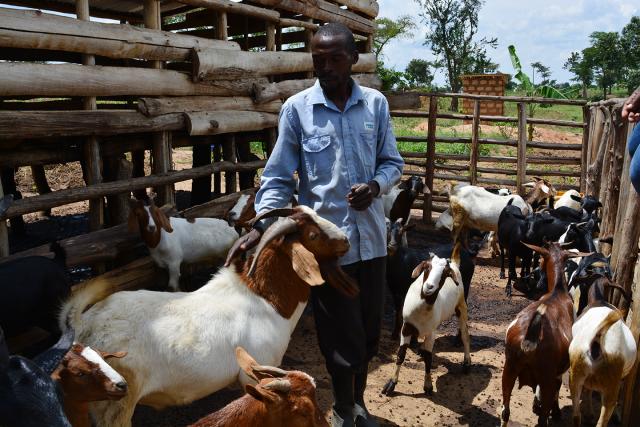
Unlike before when his goats would give birth to tiny kids that would take long to mature, the cross breeds that were fathered by the Boer buck grow faster, are bigger and fetch more profits.
“I recently sold one of my cross breed kids at UGX 200,000 (€47), and bought a mature Ankole goat at UGX 150,000 (€35), hence earning a profit of UGX 50,000 (€12),” said Bihonzi.
Over a period of a year and a few months, Bihonzi has accumulated 57 goats through goat breeding, as well as selling and doubling the purchases with profits fetched from sales.
Bihonzi not only attributes the expansion of his goat farm to the existence of the Boer buck, but also, to the improved techniques that he uses in managing the farm and the modern barn he acquired from LWF.
Bihonzi was one of the refugees and host community residents in 14 groups that were trained in commercial goat farming, as well as disease and pest control. The groups were also taken for an exposure visit at Kisingu Women’s Diary Goat Project in Kasese district by LWF.
“A dairy goat farm that has proved to be the best from 1994 in Uganda. They have a wealth of experience,” Margaret Nyangoma, a PRM project officer with LWF, says of the goat farm.
From the training and exposure visit, Bihonzi realised his potential of becoming a commercial goat dairy farmer and own a farm as big as the Kisingu Women’s Diary Goat Project.
“I listened to testimonies about Kisingu farm’s development from a few goats owned by women to one of the biggest farms in Uganda,” Bihonzi said. “I was inspired and went home with my mind set on venturing into commercial goat farming, which I did and I am already savouring my success.”
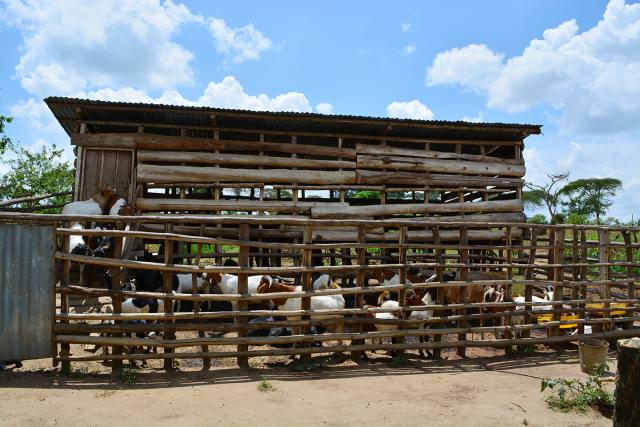
Transitioning from an old local barn to a new modern goat shelter
From a falling barn, Bihonzi acquired a new modern goat shelter from LWF. The facility is made of wood, it is sturdy and easy to maintain as explained by Bihonzi. It also has standard ventilation for easy flow of fresh air.
Nyangoma expounds that they considered well ventilated shelters to also prevent moisture and dusty conditions that can result in infections for the goats.
Just like Bihozi, Ziragwira Ngerero, a refugee who owns 42 goats and was also supported by LWF with a goat facility. He says the clean environment for his goats allow them to fatten and breed.
Since they were trained on how to manage goats in a modern barn, how to keep them clean and how to prevent them from getting infected, both Bihozi and Ziragwira keep the goat barns always clean and often deworm, vaccinate and wash their goats regularly. They also graze the goats in the wild grasslands, where they feed on unlimited browse that facilitates their fattening.
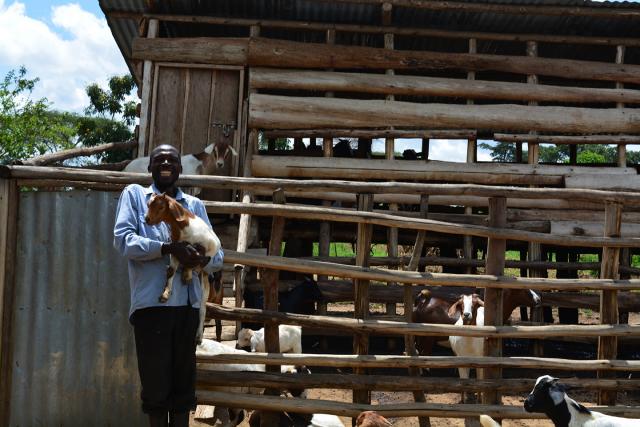
Self-reliance and livelihoods improving with commercial goat farming
Both Ziragwira and Bihonzi earn a living from goat trading. They sell bigger goats at higher prices and buy smaller ones at lower prices to get profits.
“I used the UGX 1,300,000 (€301) cash grant that I got after the training to buy kids which I feed to fatten and then sell them off at a profit,” said Bihonzi who explains that he saves at least 500,000 (€116) from goat trading every month.
With profits from his goat business, Bihonzi, a father of 7, meets his family’s financial needs. “I can now afford to take my children to good private schools, feed my family on a balanced diet and afford their medical care,” said Bihonzi. “We are living peacefully and happily.”
Ziragwira also meets his family’s basic needs using profits from the business. “I recently bought a solar energy system, my home is now connected to electricity and I also constructed our new latrine since the old one was full,” he adds.
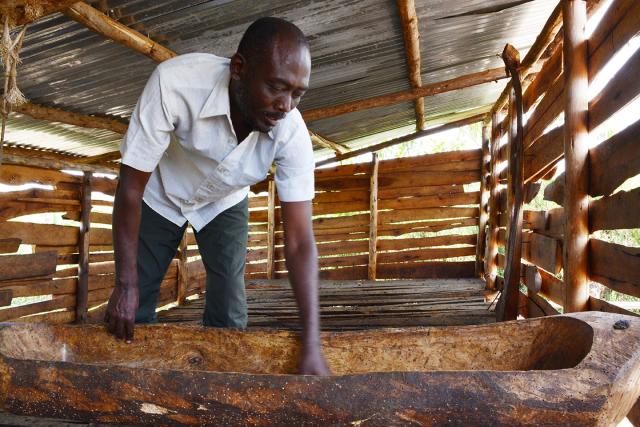
With funds from PRM, LWF supported 274 people in 14 groups from refugee and host communities in Rwamwanja settlement with Boer bucks, spray pumps, training, cash grants and goat barns to venture and improve goat farming. This was aimed at improving their livelihoods and self-reliance.
LWF appreciates PRM's support towards its humanitarian activities to improve people's livelihoods in Rwamwanja settlement.

